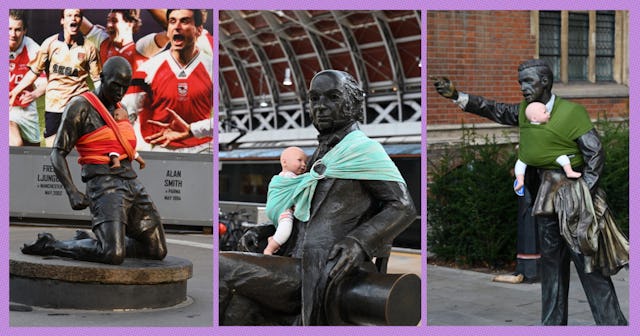Activists Tie Baby Dolls To Male Statues In Call For Better UK Paternity Leave
You’ve got to see the pictures.

When I had my daughter, we were posted up a little bit longer in the hospital due to some birth complications. By the time we were discharged, my husband had to go back to work. Yes, that’s right. We had absolutely zero time together at home as a family because his paternity leave policy was next to nothing. This frustrated my husband to no end. He raced home every single evening after work to spend just a little bit of time with us, hoping to lend me a hand during the witching hour.
There need to be better paternity leave policies. Full stop. Thankfully, some men in the U.K. are working to change things for future generations, and they’re making waves in such a visual and remarkable way.
Activists from a new campaign group, The Dad Shift, tied model babies to statues to bronze statues of men across central London and called on the government to improve the UK’s parental leave options, which are ranked the least generous in Europe for fathers.
The statues included the engineer Isambard Kingdom Brunel, the actors Laurence Olivier and Gene Kelly, and athletes Thierry Henry and Tony Adams.
According to The Guardian, the United Kingdom has the worst paternity leave offer in Europe, with only two statutory weeks of leave, paid at £184.03 a week. As a result, recent research found one in three fathers in the U.K. took no paternity leave after the birth of their child, and one in two families where the fathers took paternity leave reported struggling financially afterward.
Members of The Dad Shift plan to deliver an open letter, now posted to their website, to prime minister, Keir Starmer, later this month, calling on him to take swift action to improve paternity leave.
The letter reads:
To the Prime Minister, Sir Keir Starmer MP,
During the election you were attacked for wanting to spend even one night a week with your kids. As fathers and parents, we admired both the commitment you show your family and the conviction with which you were willing to defend it.
It’s because of that commitment and that conviction that we wanted to write and ask for your help, making sure dads across the country can show up for their families just as you show up for yours.
Today the UK has the worst statutory paternity offer for new fathers across the whole of Europe, equating to just two days leave at full pay. One in three fathers take no leave at all when a new baby arrives, while one in two who do report struggling financially because of it.
Proper parental leave for fathers and co-parents is good for mothers, good for babies, good for fathers and good for society too including improving health outcomes for all. Countries with 6 or more weeks paternity leave also have a gender pay gap that’s 4% smaller and a workforce participation gap that is 3.7% smaller too, meaning change can help grow the economy while helping British families.
With Labour committed to reviewing parental leave arrangements within its first year in office, we’re asking you to meet with us and consider getting behind The Dad Shift’s call for parental leave that is affordable for people to take, gives a substantial allowance of time, and supports equality among parents.
You’ve spoken about distance in your own relationship with your father, and yet how even across it he helped shape the dad you have now become. We’re asking that you help whole generations of fathers close this gap, give dads the time they need to spend with their kids and figure out the fathers they want to become.
New polling, carried out for the campaign launch, found that an overwhelming 90% of fathers said they wanted to be a bigger part of their children’s lives.
The Labour Party promised in its manifesto that its government would “review the parental leave system, so it best supports working families, within its first year in government”.
So, who was leading the charge of this amazing moment of activism and fight for change?
The Dad Shift’s co-founders, George Gabriel and Alex Lloyd Hunter, traveled around central London to attach model babies to the statues of men. They were assisted by Mel Pinet, who runs classes to help parents master the art of tying baby slings and bond with their newborn babies.
The sight of the statues of distinguished male figures with babies wrapped to their chest attracted considerable interest from morning commuters.
“A lot of people stopped to take photographs; people responded very warmly. We meant it to be a positively provocative sight,” Gabriel said.
“There’s such an imbalance in our portrayal and understanding of figures in public life. Women are often asked questions about their lives as wives, mothers and daughters, while male figures in public life are often not invited to share that part of themselves. We wanted to call attention to their role as fathers and also the need to better support people when babies arrive into their lives.”